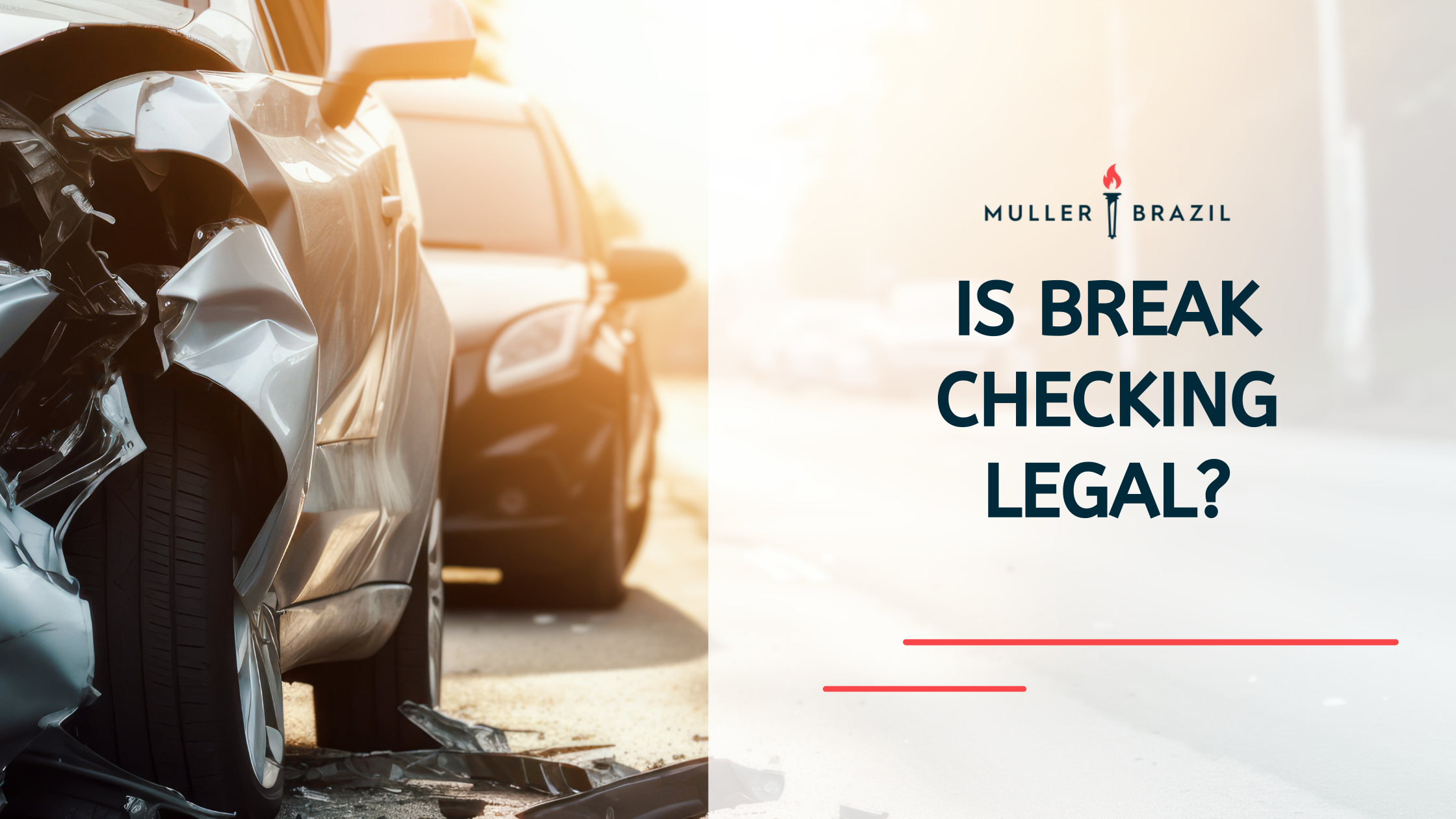In car accidents, liability falls on the driver who is found to be at fault for causing the collision. This is often based on traffic laws and the circumstances of the accident. For instance, if a driver runs a red light and hits another vehicle, they're likely liable for the damages.
Insurance companies and legal authorities investigate the incident, considering factors like eyewitness testimonies, traffic camera footage, and police reports to establish fault. Brake checking, however, presents a unique challenge in determining liability. Brake checking is often a form of retaliation or road rage. This act can lead to rear-end collisions, which are generally presumed to be the fault of the driver in the rear. However, proving that the front driver engaged in brake checking and acted with aggressive intent is difficult. Unlike straightforward accidents, there may be limited physical evidence or witnesses to corroborate the front driver's aggressive behavior. Let’s find out more.
What is Break Checking?
Brake checking occurs when a front car driver intentionally hits the brakes hard to force the car behind them to slow down quickly. This maneuver is often used by frustrated front car drivers who want to send a message to tailgaters. However, it can lead to severe accidents, especially on highways, public roads, freeways, interstates, city streets, and in traffic.
Why Do Front Car Drivers Brake Check?
Front Car Drivers may brake check for various reasons, including:
- Frustration with a tailgating vehicle.
- Attempting to maintain a safe following distance.
- Asserting control over the driving situation.
However, brake checking causes more harm than good, leading to collisions and legal consequences. According to the National Highway Traffic Safety Administration (NHTSA), rear-end collisions account for nearly 29% of all traffic accidents in the United States.¹ Many of these accidents result from sudden stops or aggressive driving like brake checking.
Who assumes liability?
Who assumes liability is the most important question when it comes to a brake checking accident. Brake checking is illegal due to its dangerous nature. Traffic laws promote safe driving practices, and brake checking directly contradicts these principles.
However, as with many laws, establishing liability beyond reasonable doubt isn’t an easy task.
Legal Consequences for Front Car Drivers
Brake checking is seen as a form of aggressive driving, which is illegal in many jurisdictions. It can lead to charges such as:
- Reckless driving
- Endangerment
- Assault with a vehicle
The specific consequences depend on the location and the severity of the incident.
Rights and Responsibilities of Rear Car Drivers
Rear car drivers have the responsibility to maintain a safe following distance to avoid collisions, even if the front car engages in dangerous behavior. However, if a rear-end collision occurs due to brake checking, the rear driver can file a claim against the front driver for causing the accident.
Accidents and Collisions
When a front driver brake checks, the rear driver might not have enough time to react, leading to a rear-end collision. Brake checking forces the rear driver to react instantly, and if they are following too closely or are distracted, a collision is almost inevitable. This is particularly risky on:
- Highways
- Freeways
- Interstates
- In heavy traffic where vehicles travel at higher speeds and have less room to maneuver
The abrupt stop caused by brake checking causes a chain reaction, potentially leading to multi-car pileups.
Legal Implications for Both Drivers
In the event of a brake check-induced accident, the rear driver is usually presumed at fault because they are required to maintain a safe following distance. However, if proven that the front driver brake checked intentionally, they may be held liable for the accident. This requires clear evidence such as dashcam footage or witness testimonies.
For the rear driver, being involved in a brake check accident means dealing with insurance claims and potential legal battles to prove the fault of the front driver. If successful, the rear driver can seek compensation for:
- Damages
- Medical expenses
- Other related costs
On the other side, the front driver could face charges for reckless driving and endangerment, leading to fines and possibly more severe penalties like a suspended license, depending on the jurisdiction.
Contact Us Now
Claims and Lawsuits
Brake checking ends in complicated legal battles. Understanding how to process these claims and lawsuits following a brake checking incident is important for both front and rear car drivers.
Filing a Claim or Lawsuit
If you are the rear car driver involved in a brake check accident, you may need to file a claim with your insurance company and potentially pursue a lawsuit against the front driver. It's important to gather as much evidence as possible to support your case. This includes:
- Dashcam footage capturing the brake checking incident.
- Eyewitness testimonies from other drivers or pedestrians.
- Police reports documenting the accident and any citations issued.
If the evidence supports that the front driver intentionally brake checked, you can file a personal injury lawsuit to seek compensation for damages.
Potential Outcomes and Compensation
The outcome of a brake checking lawsuit depends on the strength of the evidence and the specific circumstances of the case. Successful claims result in various forms of compensation for the rear driver, such as:
- Medical expenses: Coverage for hospital bills, rehabilitation costs, and any future medical care needed as a result of the accident.
- Vehicle repairs: Compensation for the cost of repairing or replacing your damaged vehicle.
- Lost wages: Reimbursement for income lost due to the inability to work following the accident.
- Pain and suffering: Damages awarded for physical pain, emotional distress, and decreased quality of life resulting from the accident.
Caution for Front Car Drivers
While brake checking may seem like a quick fix to deter tailgaters, it poses risks both physically and legally. Adopting safer strategies is a much wiser course of action for all.
Alternative Methods for Dealing with Tailgaters
Instead of resorting to brake checking, front car drivers should consider safer methods to handle tailgaters:
- Gradual slowing: Gradually reducing speed encourages the tailgater to pass without causing a sudden stop.
- Changing lanes: If safe and possible, moving to another lane allows the tailgater to pass.
- Increasing following distance: Creating more space between your car and the car in front of you is a buffer in case you need to brake suddenly.
- Using turn signals: Signaling your intentions helps the tailgater understand your actions and reduce the likelihood of sudden braking.
Advice for Staying Safe and Avoiding Legal Trouble
- Stay calm: Keep your cool and avoid aggressive responses to tailgaters.
- Follow traffic laws: Adhering to speed limits and road regulations prevents conflicts and accidents.
- Document incidents: If you frequently encounter tailgaters, consider using a dashcam to document any dangerous behavior. This is key when evidence is needed.
By avoiding brake checking and using safer driving practices, front car drivers can protect themselves from legal issues and ensure a safer driving environment for everyone.
How We Can Help
Brake checking is a dangerous and generally illegal maneuver that unfortunately leads to severe accidents and significant legal consequences. Understanding the legality of brake checking is necessary as a driver. Finding safer ways to deal with tailgaters is important to avoid legal trouble and guarantee road safety. If you find yourself involved in a brake checking incident, you will want to seek professional legal advice. At Muller Brazil, our experienced attorneys can help you work through your case, whether you're pursuing compensation or defending against claims.
For legal support, contact Muller Brazil for a free consultation. Our dedicated team is here to assist you in understanding your rights and achieving the best possible outcome for your situation.
Sources:
- Rear-end collisions account for nearly 29% of all traffic accidents, https://www.nhtsa.gov/data
Meet the Author
Paul Brazil - Founding Partner
Paul Brazil is a native of Dunmore, Pennsylvania and a graduate of Dunmore High School. For his undergraduate education, he attended Bloomsburg University where he majored in political science. He then went on to earn his JD from Widener University School of Law. Following graduation from law school, Mr. Brazil worked at a large Philadelphia civil defense firm where he litigated workers’ compensation claims and Heart and Lung Act cases.
Learn more about Paul Brazil ⇒





